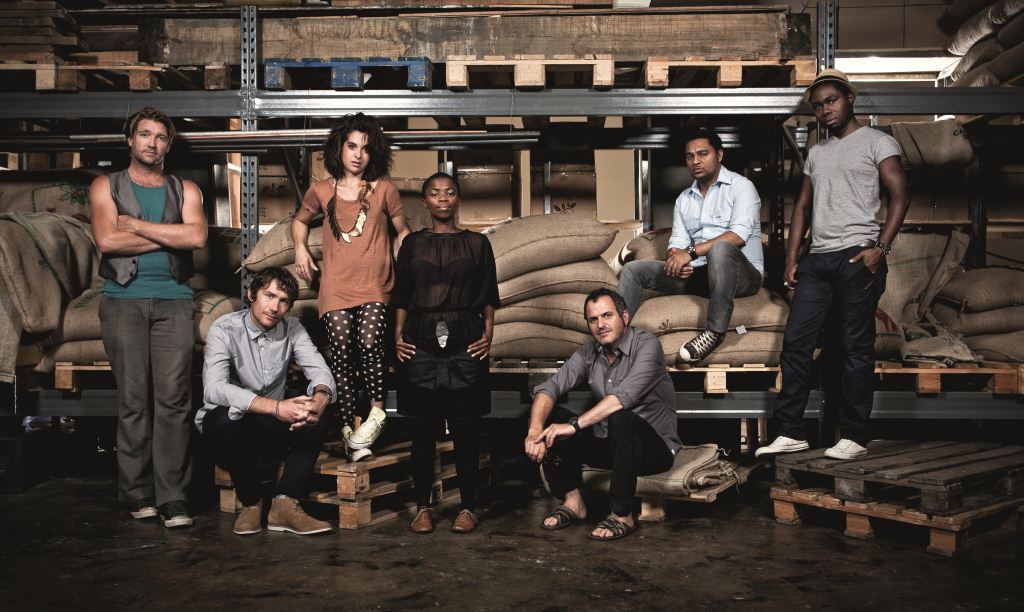The seven members of music group Freshlyground are young, hip, charming, funny and, mostly, good looking, with band members hailing from South Africa, Zimbabwe and Mozambique. Even their musical style is a vibrant fusion of Afro-pop, indie, jazz and electronic.
Freshlyground is South Africa’s dream of the ‘Rainbow Nation’ personified. It’s a dream they now want to take overseas. In March, the band, for the first time, released an album in the United States, a major feat that they celebrated with a five-stop tour along the country’s east coast.
Releasing an album in the United States in CD format, not only digitally, is a huge career move for any musician, giving access to 315 million potential listeners.
“Of course, a break into the American market is the top prize for every band. But it’s also a notoriously difficult market to penetrate, one that is largely controlled by giant record labels,” says bassist Josh Hawks.
There is one hitch, though: the support of a major record label is exactly what Freshlyground doesn’t have, since it parted ways with Sony a couple of years ago. Sony BMG Africa had signed the seven-piece-band in 2004 after coming across the catchy, feel-good lyrics of their song ‘Doo Be Doo’. Sony released Freshlyground’s album Nomvula later that year, which sold 400,000 units and achieved double platinum status in South Africa.

In 2005, Freshlyground was nominated for three South African Music Awards (SAMAs) for Nomvula, although they didn’t win any. A year later, MTV Europe honored them as Best African Act and in 2008 the band won the Best Group SAMA as well as Album of the Year for their third album ‘Ma’ Cheri’, and Best English Adult Contemporary Album.
But it has been difficult to keep up the initial success. Ma’ Cheri sold 87,000 units and in 2010 album number four, Radio Africa, was purchased by a mere 27,000 listeners.
Then came a major stroke of luck. International football association FIFA selected ‘Waka Waka’, a song produced by Freshlyground in collaboration with international pop icon Shakira, as the official anthem for the 2010 Soccer World Cup.
“We were in New York to mix our album Radio Africa, when our producer [Fabrice Dupont] ran into Shakira’s producer and heard she was looking to collaborate with an African band for the World Cup song,” says lead singer Zolani Mahola.
‘Waka Waka’ became a worldwide hit and with more than four million copies—the best-selling World Cup anthem in the digital age. Nonetheless, outside of South Africa, ‘Waka Waka’ has mainly only been associated with the Colombian pop icon. Freshlyground’s CD sales remained sluggish.
To those in the industry it was little surprise that when Freshlyground’s contract with Sony came to an end, it was not renewed.
“We were tired of the traditional model where the record company takes a big slice of the pie for little work,” says violinist and backing vocalist Kyla-Rose Smith.
Since their departure from Sony, the band produced their fifth album, Take me to the Dance, out of their own pockets, enlisting Grammy award-winning producer Steve Berlin.
“This time we wanted to retain as many rights as possible,” says Smith.
They struck a deal with retailer Pick ’n Pay to distribute the CD to its stores nationwide. But after putting out the first 5,000 units in this way and managing the back-end of the distribution themselves, the band quickly understood that they had bitten off more than they could chew.
Freshlyground enlisted Johannesburg-based media entertainment company Electromode to get Take me to the Dance into music stores. The move helped sales somewhat but a good four months after being released in South Africa, it had only sold a meager 10,000 units.
On the upside, drummer Peter Cohen says that going independent has opened up opportunities to negotiate releases on the international market, removing a lot of red tape, since distributors won’t have to negotiate with Sony.
“When we still were with Sony, we tried to
break into the US market several times, but for various different reasons, it never worked out. So we tried to re-position ourselves and identify new platforms for sales,” says Simon Attwell, the band’s flautist.
Freshlyground signed with Word of Mouth Music (Wommusic), a small Scandinavian “boutique label”, which managed to take Take Me to the Dance to the United States and Canada within a short space of time. There was also interest for a European distribution deal, says Smith.
It all comes down to the old question of whether you prefer to be a big fish in a small pond or a small fish in a big pond. Indie labels, such as Wommusic, have far less money to fund records, airplay and tours but give artists a lot more attention than a behemoth like Sony. But in the end, only major labels have the means to turn a band into an international success.
Freshlyground definitely have one thing going for them. When they landed their—at least for now—only major hit ‘Doo Be Doo’ and their album went double platinum, they didn’t get carried away or lead a wild, expensive rock star life. The band decided to remain financially prudent and agreed to pay each member a fixed, monthly salary.
“Running the band like a business has contributed to our longevity. Having a salary at the end of every month means we can work as musicians, with [financial] security,” says Attwell.
And that has worked for them for more than a decade. FL
